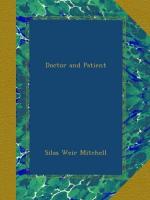The books on mind-cure are calculated to make much and serious evil. I have read them with care, and have always risen from them with the sense of confusion which one would have if desired to study a pattern from the back of a piece of embroidery. There is, however, a class of minds which delight in the fogs of mystery, and, when a book puzzles them, accept this as evidence of depth of thought. I have been bewildered at times by the positiveness and reasoning folly of the insane, and I think most trained intelligences will feel that books like these mystical volumes require an amount of care and thinking to avoid bewilderment of which the mass of men and women are not possessed. In a few years they will be the rarely read and dusty volumes, hid away in libraries, and consulted only by those who undertake the sad task of writing the history of credulity. Their creed will die with them, and what is best of it and true will continue to be used by the thoughtful physician, as it has been in all ages. But, meanwhile, it is doing much harm and little good. Every neurologist sees already some of its consequences, and I, myself, have over and over had to undo some of the evil it had done.
Our nervous woman is well. Slowly, very slowly, she has won flesh and color, which means gain in quality and quantity of blood. By degrees, too, she has been able to return to the habits and endurances of health. And now she asks that other question, “I have daughters who are yet young, but how shall I guard them against nervousness?” and again puts forward this single complex symptom in disregard of the states of body which usually accompany it, and are to us matters quite as grave. She knows well that the mass of women are by physiological nature more liable to be nervous than are men. It is a sad drawback in the face of the duties of life, that a very little emotional disturbance will suffice to overcome the woman as it does not do the man, and that the same disease which makes him irritable makes her nervous. Says Romanes, in an admirable and impartial article on the mental differences of men and women, “She is pre-eminent for affection, sympathy, devotion, self-denial, modesty, long-suffering or patience under pain, disappointment, and adversity, for reverence, veneration, religious feeling, and general morality.” I accept his statement to add that these very virtues do many of them lead to the automatic development of emotion, which, in its excesses and its uncontrolled states, is the parent of much of the nervousness not due to the enfeeblement of disease.[5]




